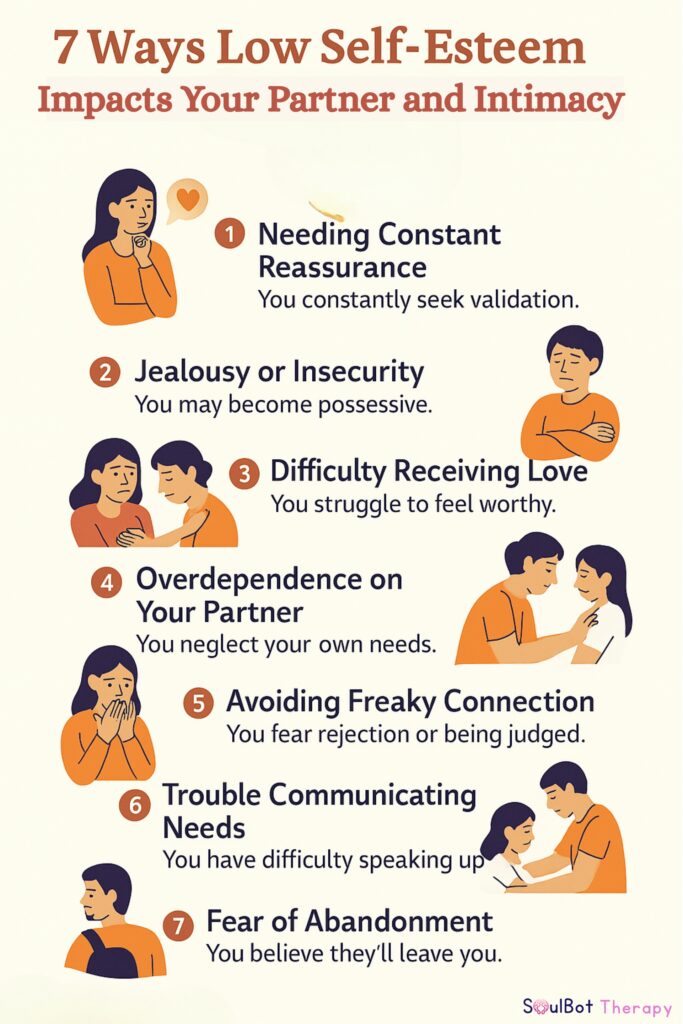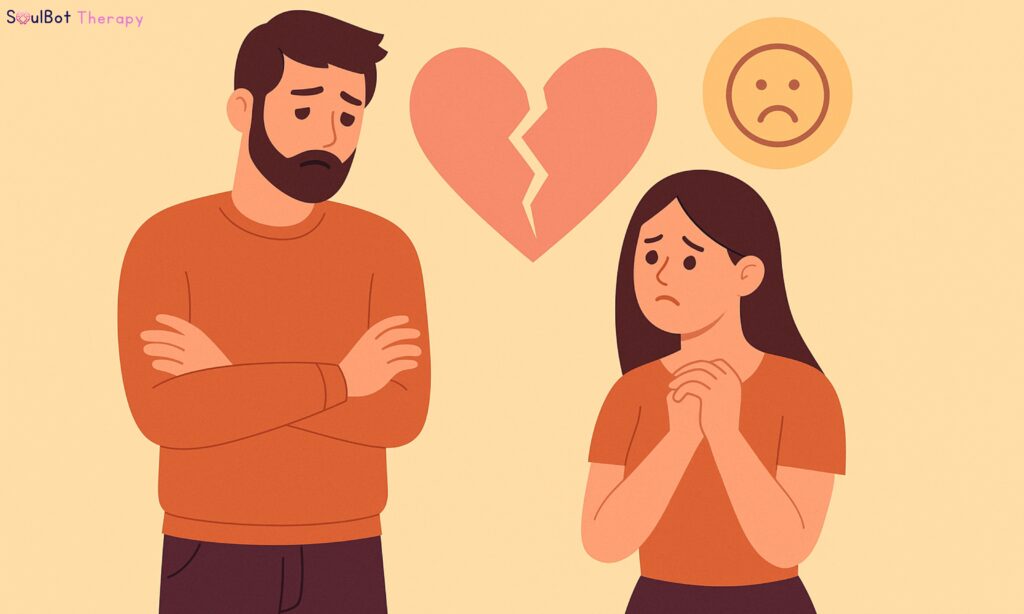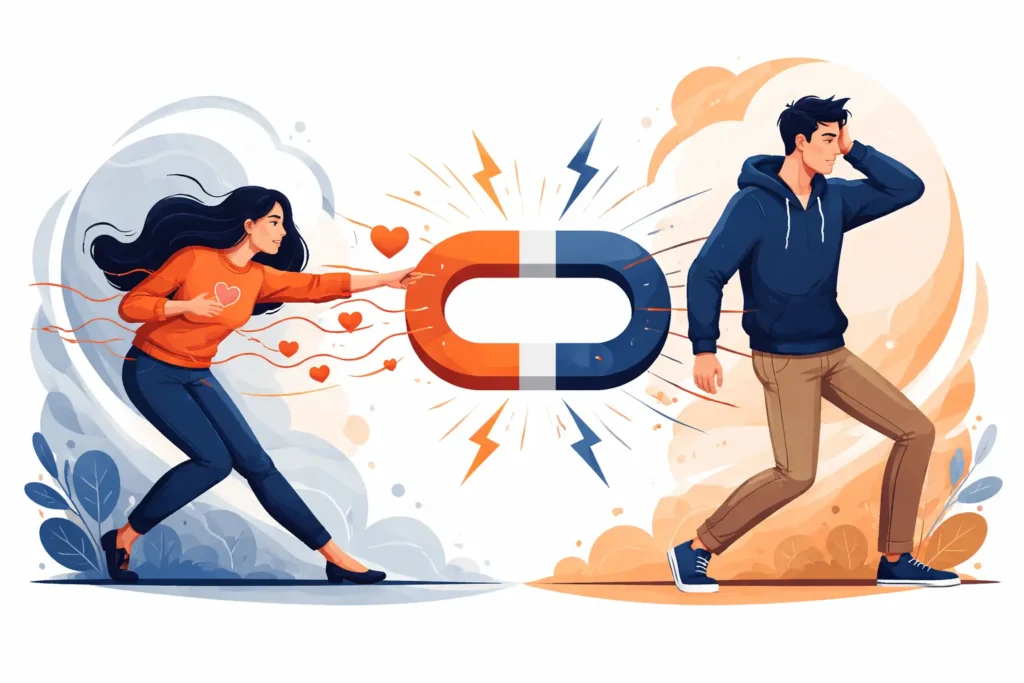- You love deeply but doubt constantly.
- You crave closeness but overanalyze every silence.
- You want to feel safe, but something inside tells you you’re not “enough.”
At first glance, a low self-esteem relationship might not seem toxic or explosive, but over time, it becomes quietly exhausting. And if you’ve ever felt like you’re too much or not enough in love, you’re far from alone.
Let’s explore how low self-esteem affects relationships and, more importantly, how you can begin to heal.
What Does Low Self-Esteem Look Like in a Relationship?
Low self-esteem doesn’t just appear as insecurity.
It hides in your patterns — in how you love, protect, push, and pull.
You might be in a low self-esteem relationship if:
- You apologize too often, even when it’s not your fault
- You fear your partner will leave “once they see the real you.”
- You have a hard time believing your partner genuinely likes or loves you
- You overthink texts, silences, and facial expressions
- You don’t speak up about your needs because you don’t want to be “a burden.”
These aren’t flaws. They’re defense mechanisms born from past wounds — and they’re reversible.
💡According to the American Psychological Association study attachment theory, emotional self-sabotage, or relationship patterns (non-commercial)
7 Ways Low Self-Esteem Affects Your Partner and Intimacy
1. You Seek Constant Reassurance
No matter how many times your partner affirms you, it never feels like enough.
- You don’t believe the compliment.
- You search for proof.
- You worry they’ll change their mind.
2. You Get Jealous — Even When There’s No Reason
Relationship insecurity convinces you to compete — even with their past.
- You compare
- You overanalyze
- You spiral
3. You Fear Abandonment
You expect people to leave. So, you either cling too tightly or sabotage the relationship to feel “in control.”
4. You Can’t Receive Love Easily
Compliments feel awkward. Physical affection makes you self-conscious. You downplay their kindness as “just being nice.”
5. You Emotionally Self-Sabotage
- You pick fights.
- You push them away.
- You test if they’ll stay — and when they do, you still don’t feel safe.
6. You Suppress Your Needs
You want to appear “chill.” So you don’t express when something hurts. You say yes when you want to say no.
7. You Project Your Insecurities
It becomes hard to tell the difference between your fear and their actions.
What you believe they think of you often mirrors what you already believe about yourself.
And in trying to protect your heart, you end up pushing love further away.
Quote to remember:
“You don’t ruin relationships because you’re unlovable. You sabotage them because you forgot you were already enough.”
Why We Self-Sabotage When We Feel Unworthy?
When love feels unfamiliar, we question it.
That’s when old survival patterns kick in. What we learned about love early on doesn’t just vanish — it lingers in the background, quietly shaping our reactions. So when love feels unfamiliar, we start to brace ourselves. We question its safety. We anticipate the fallout. And suddenly, even healthy love feels hard to trust.
“I need to earn love.”
So when someone offers it freely, you don’t trust it.
- You poke holes in it.
- You anticipate rejection.
- You brace for abandonment.
This is emotional self-sabotage — and it’s a trauma response.
You’re not broken. You’re just protecting yourself — even when you don’t need to.
💖Read more about whether you have low self-esteem or not.
Real-Life Signs You’re Projecting Insecurity
Let’s get honest: These patterns don’t mean you’re dramatic. They mean you’re human — and possibly hurting.
- 🟡 You replay convos over and over
- 🟡 You worry they’re “bored of you” after a quiet day
- 🟡 You pre-apologize before sharing your feelings
- 🟡 You feel uncomfortable when they compliment you
- 🟡 You avoid asking for things, then feel resentful
These are all signs of relationship insecurity linked to self-esteem wounds.
How Relationship Anxiety and Self-Worth Are Connected?
When your self-worth depends on someone else’s attention, love becomes anxiety.
You:
- Monitor everything — tone, timing, reactions
- Assume the worst — even when there’s no evidence
- Fear being “too much” — so you become less than yourself
This is called relationship anxiety, and it’s deeply rooted in self-worth issues.
You’re not just scared they’ll leave. You’re scared they’ll stay and realize you’re not lovable.
Can You Heal a Low Self-Esteem Relationship?
Yes — but it doesn’t start with fixing the relationship. It starts with fixing your relationship with yourself.
You don’t need to:
- ❌ Perform better
- ❌ Change who you are
- ❌ “Work harder” to be lovable
You need to:
- ✅ Understand your patterns
- ✅ Get curious, not critical
- ✅ Start rebuilding your emotional safety

🔗 Explore More: 7 Hidden Signs of Low Self-Worth – SoulBot Therapy
How to Begin Healing From Low Self-Esteem in Love?
🌱 Notice Your Internal Dialogue
Are you kind to yourself? Or constantly questioning?
🧠 Journal Your Triggers
- “When do I feel small in love?”
- “What do I expect that makes me anxious?”
🪞 Try Mirror Work
Say one nice thing to yourself out loud. Daily. Watch how hard — and healing — it is.
🧪 Take a Self-Esteem Test
Sometimes, a quiz reveals patterns we’ve been too close to see.
💬 Talk to Someone
A therapist or support group can hold up a mirror and remind you of your worth.
✨Is your relationship draining you instead of growing you?
It’s not your fault, but it can be your breakthrough.
👉 Take the Self-Esteem Test to discover what’s driving your patterns and how to heal.
You Deserve Love That Doesn’t Hurt to Hold
You weren’t born doubting yourself. That doubt was planted over time by people who didn’t see you clearly. Now, it’s time to unlearn it.
Because real love doesn’t ask you to shrink, it invites you to show up fully.
👉 Take the Self-Esteem Test or Book a Free Consultation with a therapist who gets it.
You don’t have to do this alone anymore.
FAQ
Q1: How do low self-esteem relationships feel over time?
They feel confused, full of love, fear, self-blame, and longing. It’s an emotional rollercoaster that never feels fully safe.
Q2: What causes emotional self-sabotage in love?
Often, it’s childhood experiences where affection was conditional or inconsistent.
Q3: Can therapy help with relationship anxiety and self-worth?
Absolutely. Therapy can help you separate past wounds from present patterns — and build secure emotional foundations.
Q4: Can two people with low self-esteem build a healthy relationship?
Yes — if both are committed to self-awareness and growth. Healing together is possible.
Q5: What’s the first step to change this?
Start by identifying your voice vs the internalized voice of fear. A self-esteem quiz can help begin that process.








